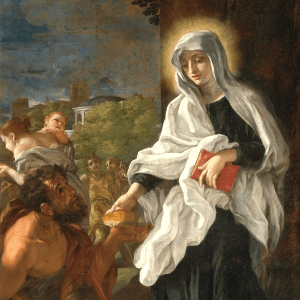
St Frances of Rome was an Italian wife and mother, mystic, and Benedictine oblate. She was born in the 1300s and founded a religious community of oblates.
Read the full St Frances of Rome novena on the novena page. You can also learn more about novenas here.
What Was St Frances of Rome Known For?
Frances was born in Rome in 1384 to a noble family.
Her mother was devout and humble and led to to great devotion to our Lord. Her father taught her to be dedicated and resolute.
At an early age, Frances wanted to enter religious life and become a nun, but her father opposed that idea.
In fact, her father had prearranged a marriage with her to a son of another noble (and rich) family.
She had to obey her father, but she prayed fervently that God would stop the marriage from taking place.
At age thirteen, she was married, and due to their noble backgrounds, this quiet, faithful girl had to enter society with galas and social events.
Frances dutifully tried to be the social butterfly that her new life demanded, but it exhausted her, and one day she fainted from the toll it took on her, leading to a serious condition for many months, where she was near death.
During her agony, St Alexis appeared to her. He also had been a noble like Frances, and he ran away from home rather than marry.
St Alexis, on behalf of God, asked Frances whether she wanted to recover or die?
Frances wanted to die. But, like Christ in the Garden of Gethesemane, she said Thy will be done, and St Alexis confirmed that she would then live, and live to glorify Christ’s Name.
Frances recovered quickly, and her husband Lorenzo, who was a good man, renewed his dedication to her.
She found an unexpected ally in her sister-in-law, Vannozza, who shared Frances’s desire to have been a nun rather than married, and who endured the parties and social life with longsuffering patience.
Frances and Vannozza prayed together and grew in piety through each other’s encouragement.
Frances embraced both her nobility as well as her married state of life, and with a smile did her duties, however odious they were to her.
She also began doing corporal and spiritual works of mercy to the poor and imprisoned.
She had her first-born son, Battista, around the time that her mother-in-law died. Frances was called upon to take up the matriarchal duties that her mother-in-law had had in the household, though she was just 16 years old.
She did so, however, and was skilled in the gift of administration.
She had two more children, Giovanni and Agnes, and a famine hit Rome, depleting the food and other supplies, including in Frances’s estate.
She generously gave away all the food they had, angering her husband and father-in-law, but by God’s grace, when they went down the cellar and saw it was bare and empty, Frances opened a tap on a wine cask (that had been completely drained) and wine flowed out!
Similarly, the empty corn silo became filled with good corn.
Her husband and father-in-law finally realized that Frances was close to God, and her faith led them to a deeper conversion of faith.
War and strife hit Rome, and her family was engulfed in it. After surviving one wave of danger, her husband Lorenzo escaped from Rome to avoid being killed, but attackers broke into Frances’s estate, murdered her servants, destroyed buildings, and kidnapped her son Battista to Naples.
At that time, another plague hit Rome and Frances’s other son, Giovanni, succumbed to it at 9 years old. Battista was spared since he was in Naples.
Frances was left with one son dead, one kidnapped, and her husband gone. She refused to give up and made what was left of her home into a refuge area for all the displaced people of Rome.
Her son Giovanni miraculously appeared to Frances one year later and prophesied that her daughter Agnes would die.
But, Giovanni told her, in consolation God was giving Frances an Archangel as her guardian angel, whom she would be able to see and hear.
The wars ended, and her husband, Lorenzo, and her son Battista were released to come home. Battista was fine, but Lorenzo was a shell of a man, and Frances dedicated herself to his healing.
God called Frances to start the Oblates of Mary, a lay community of women dedicated to the Benedictines.
When Lorenzo died, Frances entered into the house of the Oblates, and they made her their Superior.
It took decades, but her dream as a child of being a religious nun was finally fulfilled.
Frances died several years later, in 1440, around the age of 56.